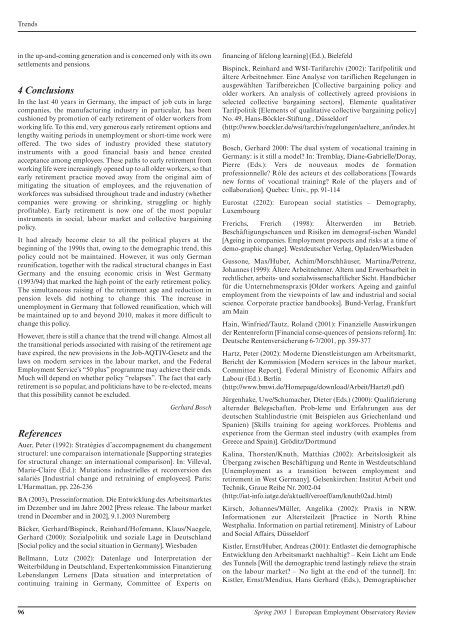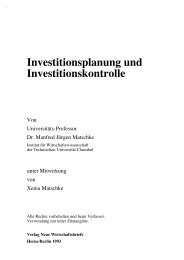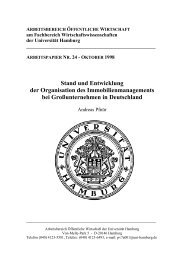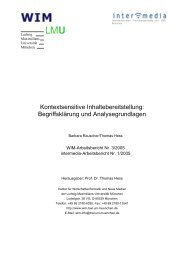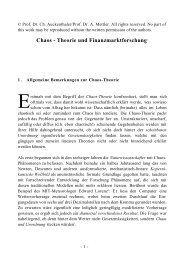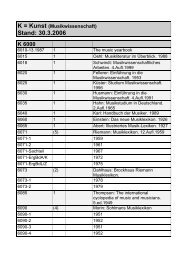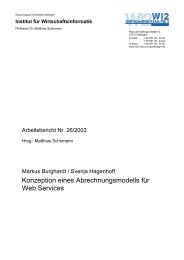FRANCE The
FRANCE The
FRANCE The
You also want an ePaper? Increase the reach of your titles
YUMPU automatically turns print PDFs into web optimized ePapers that Google loves.
Trends<br />
in the up-and-coming generation and is concerned only with its own<br />
settlements and pensions.<br />
4 Conclusions<br />
In the last 40 years in Germany, the impact of job cuts in large<br />
companies, the manufacturing industry in particular, has been<br />
cushioned by promotion of early retirement of older workers from<br />
working life. To this end, very generous early retirement options and<br />
lengthy waiting periods in unemployment or short-time work were<br />
offered. <strong>The</strong> two sides of industry provided these statutory<br />
instruments with a good financial basis and hence created<br />
acceptance among employees. <strong>The</strong>se paths to early retirement from<br />
working life were increasingly opened up to all older workers, so that<br />
early retirement practice moved away from the original aim of<br />
mitigating the situation of employees, and the rejuvenation of<br />
workforces was subsidised throughout trade and industry (whether<br />
companies were growing or shrinking, struggling or highly<br />
profitable). Early retirement is now one of the most popular<br />
instruments in social, labour market and collective bargaining<br />
policy.<br />
It had already become clear to all the political players at the<br />
beginning of the 1990s that, owing to the demographic trend, this<br />
policy could not be maintained. However, it was only German<br />
reunification, together with the radical structural changes in East<br />
Germany and the ensuing economic crisis in West Germany<br />
(1993/94) that marked the high point of the early retirement policy.<br />
<strong>The</strong> simultaneous raising of the retirement age and reduction in<br />
pension levels did nothing to change this. <strong>The</strong> increase in<br />
unemployment in Germany that followed reunification, which will<br />
be maintained up to and beyond 2010, makes it more difficult to<br />
change this policy.<br />
However, there is still a chance that the trend will change. Almost all<br />
the transitional periods associated with raising of the retirement age<br />
have expired, the new provisions in the Job-AQTIV-Gesetz and the<br />
laws on modern services in the labour market, and the Federal<br />
Employment Service’s “50 plus” programme may achieve their ends.<br />
Much will depend on whether policy “relapses”. <strong>The</strong> fact that early<br />
retirement is so popular, and politicians have to be re-elected, means<br />
that this possibility cannot be excluded.<br />
Gerhard Bosch<br />
References<br />
Auer, Peter (1992): Stratégies d’accompagnement du changement<br />
structurel: une comparaison internationale [Supporting strategies<br />
for structural change: an international comparison]. In: Villeval,<br />
Marie-Claire (Ed.): Mutations industrielles et reconversion des<br />
salariés [Industrial change and retraining of employees]. Paris:<br />
L'Harmattan, pp. 226-236<br />
BA (2003), Presseinformation. Die Entwicklung des Arbeitsmarktes<br />
im Dezember und im Jahre 2002 [Press release. <strong>The</strong> labour market<br />
trend in December and in 2002], 9.1.2003 Nuremberg<br />
Bäcker, Gerhard/Bispinck, Reinhard/Hofemann, Klaus/Naegele,<br />
Gerhard (2000): Sozialpolitik und soziale Lage in Deutschland<br />
[Social policy and the social situation in Germany], Wiesbaden<br />
Bellmann, Lutz (2002): Datenlage und Interpretation der<br />
Weiterbildung in Deutschland, Expertenkommission Finanzierung<br />
Lebenslangen Lernens [Data situation and interpretation of<br />
continuing training in Germany, Committee of Experts on<br />
financing of lifelong learning] (Ed.), Bielefeld<br />
Bispinck, Reinhard and WSI-Tarifarchiv (2002): Tarifpolitik und<br />
ältere Arbeitnehmer. Eine Analyse von tariflichen Regelungen in<br />
ausgewählten Tarifbereichen [Collective bargaining policy and<br />
older workers. An analysis of collectively agreed provisions in<br />
selected collective bargaining sectors], Elemente qualitativer<br />
Tarifpolitik [Elements of qualitative collective bargaining policy]<br />
No. 49, Hans-Böckler-Stiftung , Düsseldorf<br />
(http://www.boeckler.de/wsi/tarchiv/regelungen/aeltere_an/index.ht<br />
m)<br />
Bosch, Gerhard 2000: <strong>The</strong> dual system of vocational training in<br />
Germany: is it still a model? In: Tremblay, Diane-Gabrielle/Doray,<br />
Pierre (Eds.): Vers de nouveaux modes de formation<br />
professionnelle? Rôle des acteurs et des collaborations [Towards<br />
new forms of vocational training? Role of the players and of<br />
collaboration]. Quebec: Univ., pp. 91-114<br />
Eurostat (2202): European social statistics – Demography,<br />
Luxembourg<br />
Frerichs, Frerich (1998): Älterwerden im Betrieb.<br />
Beschäftigungschancen und Risiken im demograf-ischen Wandel<br />
[Ageing in companies. Employment prospects and risks at a time of<br />
demo-graphic change]. Westdeutscher Verlag, Opladen/Wiesbaden<br />
Gussone, Max/Huber, Achim/Morschhäuser, Martina/Petrenz,<br />
Johannes (1999): Ältere Arbeitnehmer. Altern und Erwerbsarbeit in<br />
rechtlicher, arbeits- und sozialwissenschaftlicher Sicht. Handbücher<br />
für die Unternehmenspraxis [Older workers. Ageing and gainful<br />
employment from the viewpoints of law and industrial and social<br />
science. Corporate practice handbooks]. Bund-Verlag, Frankfurt<br />
am Main<br />
Hain, Winfried/Tautz, Roland (2001): Finanzielle Auswirkungen<br />
der Rentenreform [Financial conse-quences of pensions reform]. In:<br />
Deutsche Rentenversicherung 6-7/2001, pp. 359-377<br />
Hartz, Peter (2002): Moderne Dienstleistungen am Arbeitsmarkt,<br />
Bericht der Kommission [Modern services in the labour market,<br />
Committee Report]. Federal Ministry of Economic Affairs and<br />
Labour (Ed.). Berlin<br />
(http://www.bmwi.de/Homepage/download/Arbeit/Hartz0.pdf)<br />
Jürgenhake, Uwe/Schumacher, Dieter (Eds.) (2000): Qualifizierung<br />
alternder Belegschaften. Prob-leme und Erfahrungen aus der<br />
deutschen Stahlindustrie (mit Beispielen aus Griechenland und<br />
Spanien) [Skills training for ageing workforces. Problems and<br />
experience from the German steel industry (with examples from<br />
Greece and Spain)]. Gröditz/Dortmund<br />
Kalina, Thorsten/Knuth, Matthias (2002): Arbeitslosigkeit als<br />
Übergang zwischen Beschäftigung und Rente in Westdeutschland<br />
[Unemployment as a transition between employment and<br />
retirement in West Germany]. Gelsenkirchen: Institut Arbeit und<br />
Technik, Graue Reihe Nr. 2002-04<br />
(http://iat-info.iatge.de/aktuell/veroeff/am/knuth02ad.html)<br />
Kirsch, Johannes/Müller, Angelika (2002): Praxis in NRW.<br />
Informationen zur Altersteilzeit [Practice in North Rhine<br />
Westphalia. Information on partial retirement]. Ministry of Labour<br />
and Social Affairs, Düsseldorf<br />
Kistler, Ernst/Huber, Andreas (2001): Entlastet die demographische<br />
Entwicklung den Arbeitsmarkt nachhaltig? – Kein Licht am Ende<br />
des Tunnels [Will the demographic trend lastingly relieve the strain<br />
on the labour market? – No light at the end of the tunnel]. In:<br />
Kistler, Ernst/Mendius, Hans Gerhard (Eds.), Demographischer<br />
96 Spring 2003 | European Employment Observatory Review


